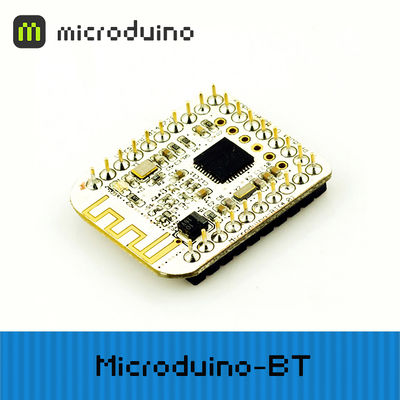|
Microduino-Shield BT 4.0 module is a plug-in device that supports Bluetooth 4.0 low energy standard.
Microduino-Shield BT 4.0 module is a bluetooth serial port transparent transmission module, using the 27 PIN standard Microduino interface, supporting the Arduino board and derivatives, such as Microduino core.
The module is designed by player ogre_c.
Features
- Microduino-Shield BT4.0 adopts U type 27 PIN interface of Microduino, combining with other Microduino modult to use;
- Microduino-Shield BT4.0 chooses the HM-10 BLE as the bluetooth core module;
- TI CC2540 chip with 256Kb space;
- Support AT instruction, capable of updating baud rate, device name,paring code and other related parameters as needed, flexible to use;
- Small, cheap, stackable;
- Open source hardware circuit design, compatible with the Arduino IDE development environment for programming;
- With uniformed Microduino interface standard and rich peripheral modules, it is flexible and convenient to have a quick connection and extension with other corresponding Microduino modules and sensors;
- 2.54 pitch row female connector for easy integration into breadboard.
Specifications
- Communication form: serial transmission;
- Power supply:+3.3VDC 50mA;
- Bluetooth protocol:Bluetooth Specification V4.0 BLE;
- Service support:Central & Peripheral UUID FFE0,FFE1;
- Frequency:2.4GHz ISM band;
- Modulation mode:GFSK(Gaussian Frequency Shift Keying);
- Power of transmission:≤4dBm;
- Sensitivity:≤-84dBm at 0.1% BER;
- Transmission rate:
- Asynchronous: 6 kbps;
- Synchronous: 6 kbps;
- State indicator:
- Two states:
- Flashing means that the module has been powered but not matched well.
- Always lighting means that the module has been matched well and has started communication.
- By the indicator, it is very easy to the status of the module, which is conveniently.
Documents
Eagle PCB 文件:Microduino-BT Shield.zip
Main component
Development
Serial communication requirements
- Default serial configuration:
- Baud rate: 9600
- No check
- Data bits: 8
- Stop bit: 1
- As for Arduino IDE serial monitor:
- Set at:"No line terminator"、"9600baud"
- For other serial debug software:
- Baud rate: 9600
- No check
- Data bits: 8
- Stop bit: 1
- We suggest using Microduino-Core32u4 to debug this BT module:
- Microduino-Core32u4 module can use the USB to simulate the serial 0, and BT uses the 32u4's serial 1 (RX0,TX1), so you don't need to change the existing jumper (RX0,TX1) and it won't impact program download or the serial port's function.
- Microduino Shield BT4.0 uses the default serial RX0,TX1 to communicate with Core module, so it can be directly connected with Microduino FT232.
Use PC to debug
- When debugging directly through the serial port:
- No need to stack the FT232 directly, and just cross connect the FT232 and BT4.0's RX0,TX1.
Use FT232R、Core download and debug
- Use default jumper (RX0、TX1):
- Unplug the Microduino Shield BT4.0 during download program;
- If you want to change the jumper cables to meet your requirement:cut the connection between two intermediate of the pad and RX0/TX1, and then connect them to D2, D3(or D9、D10).
- If changed the jumper, need the change the serial connection between Microduino Shield BT4.0 and Core module, change the connection "TX-RX0、RX-TX1" to following:
- TX-D2、RX-D3 (For Core+'s Serial1)
- TX-D9、RX-D10 (all SoftwareSeria libray to resolve)
Pin description
| HM-10 Pin |
Microduino Pin |
Function
|
| TX |
RX0(orD2/D9) |
serial send pin (TTL),connect Core's RXD
|
| RX |
TX1(orD3/D10) |
serial receive pin (TTL),connect Core's TXD
|
Application
Download progrm
Test program:文件:BLE debug uart1.zip,文件:BLE LightBlue time.zip
Shield BT4.0 pass-through data to IOS devices
- Prepared hardware:Microduino FT232R, Microduino Core, Microduino Shield BT4.0, supported Bluetooth 4.0 devices (iPhone4s upper,iPod touch 5 upper,iPad 3 upper,iPad mini upper);
- Prepared software: Arduino IDE (1.0 release and upper), Microduino test program (Arduino part), download LightBlue from App Store;
- Start Arduino IED,open the Microduino test program, board type select "Microduino Core (Atmega328P@16M,5V)", download directly;
- Start to set the IOS device:
- start the bluetooth function on IOS device;
- Open LightBlue;
- In "Central" tab find the "HMSoft", then set "Service"-"Characteristics";
- Then you can see the debugging window, click the "Start Notify".
- ASCII data can be seen displayed: "BLE, Time: xxx" after connection success, where xxx is the Core and Shield BT4.0's running time in seconds.
Use Core 32u4 to debug Shield BT4.0
- Prepared hardware:Microduino FT232R,Microduino Core 32u4 and Microduino Shield BT4.0;
- Prepared software:Arduino IDE(1.0 releae and upper), Microduino test program(Arduino part);
- (32u4 can use USB to simulate the serial 0, but BT use 32u4's serial1 (RX0,TX1), so you can use the existing jumper(RX0,TX1));
- Start Arduino IED, open the Microduino test program, board type select "Microduino Core 32u4", download directly;
- Check if the serial communication works:
- Open the serial monitor, then send "AT" (No \r\n after AT), if return "OK", that means configure success.
Use Core+'s uart1 to debug Shield BT4.0
- Prepared hardware:Microduino FT232R, Microduino Core+, Microduino Shield BT4.0;
- Prepared software:Arduino IDE (1.0 release and upper), Microduino test program (Arduino part);
- Other configuration:Suppose the player has changed the jumper which change the serial to D2、D3;
- Start Arduino IED, open Microduino test program, select the board type "Microduino Core (Atmega328P@16M,5V)", download directly;
- Check the serial communication:
- Open the serial monitor,send uppercase “AT”(no \r\n appened), if return “OK”,that means matched.
Note:If use the Android device to debug, in order to defect the BT module 4.3 release or upper is needed.
Microduino-Shield BT4.0 simple testing
Bug
History
- On June 5, 2013, the second time proofing is completed, changed its name to the "Microduino - (BT)" and added the third optional serial port - UART1, divided into 2 version, version 2.1, a module used for HM09;A 4.0 version, module used for HM10.
- On May 10, 2013, the board is completed.
|
